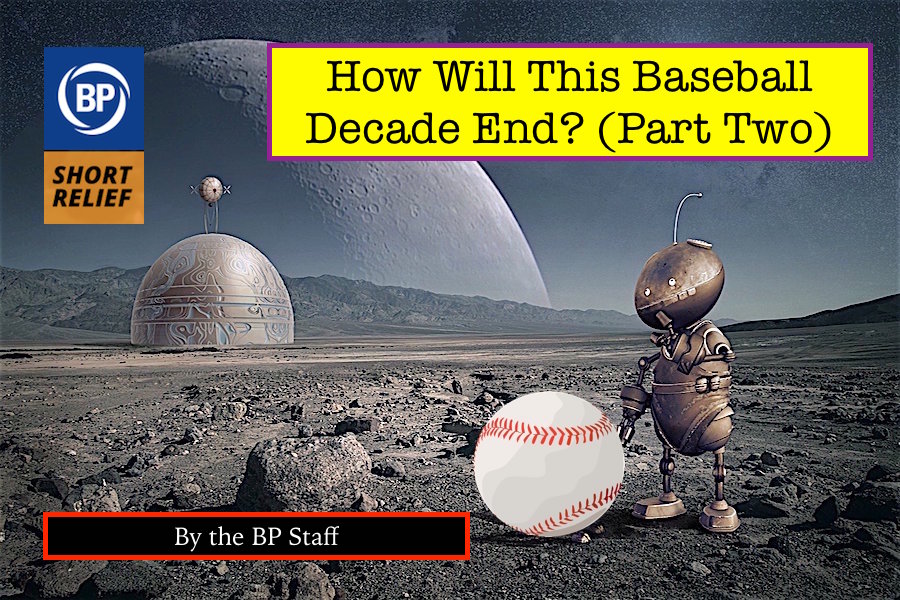
The first pitch of the first game of the 2010 Major League Baseball season was thrown by Josh Beckett of the Boston Red Sox. It was hit by Derek Jeter of the New York Yankees. Shortstop Marco Scutaro scooped it up and threw it to first baseman Kevin Youkilis for the out.
The last pitch of the last game of the 2019 Major League Baseball season was thrown by Washington Nationals closer Daniel Hudson. Michael Brantley of the Houston Astros tried to make contact with the baseball and failed. It fit snuggly in Yan Gomes’ glove.
You could have set your iPhone4s to a Jeter 6-3 putout at the start of the last decade. But if I told you then the 2019 World Series would have the Houston Astros lose to the Washington Nationals(!), you would have kicked me out of the Google group chat.
A lot could happen in ten years. Maybe you don’t want to know how it ends, and hey that’s fine. It’s not compulsory to have to read past the introduction of a Baseball Prospectus piece.
At least, not yet.
Either way, all of the following will definitely happen — maybe not in our universe, but certainly in parallel ones. You were warned.
Part one of this series can be found here.
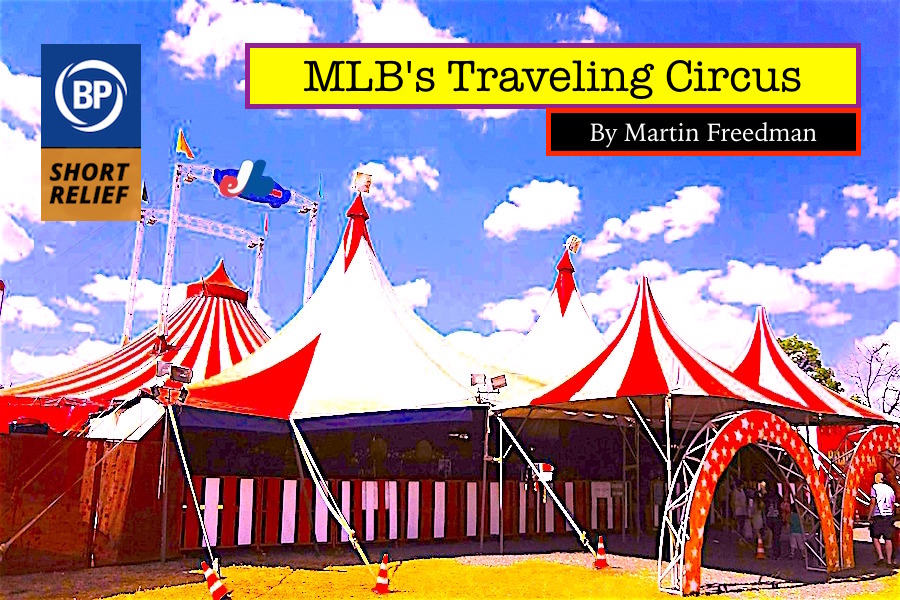
In January 2023, the Rays will get formal approval from MLB to implement Stu Sternberg’s two-city plan. They play half of their home games in the Trop, and half in a newly-constructed stadium in Montreal, former home of the Expos. Everyone in the sports world decries it as an impossible undertaking. “How can you expect anyone to be okay with this?” some ask. What about conditioning, what about the added strain on the players from the extra travel, what about the dozens of other logistical concerns?
And yes, all of these concerns are valid. But, somehow, it works. It works, because the team is good, and because they become a tourist attraction. The Trop becomes the home of the most absurd idea in sports history, and Montreal Stadium sells out every game because everyone within a hundred kilometers just has to see this for themselves.
Within a year, half of MLB wants in. Attendance has been on the downswing for years with the increase in accepted tanking, and rich owners know a cash grab when they see one. But they don’t want to build a whole new stadium, so they use the dozens of old minor league ballparks that were abandoned years prior. The two-city plan becomes such a hit with the early adopters that some even get in on three-city plans.
(The Blue Jays, by the way, travel around all of Canada. Yukon one week, Manitoba the next, Winnipeg in the last series of the year because being cold builds character.)
By 2029, with all but two teams — the Yankees, too stubborn to leave, and the Cardinals, because they said so — adopting two-city, three-city, and even four-city plans — Major League Baseball has become a traveling circus of sport. Teams pack their bags, travel to their next destination, play a three-game set, and the two teams depart. Rinse and repeat for 162 games, and the playoffs proceed as normal. (The leagues and divisions are relics, but they make for a simple way to sort the teams for the postseason brackets.)
Unfortunately for parity, twenty-eight constantly traveling teams and two entrenched fixtures have an unexpected — but obvious in hindsight — side effect. Come the postseason, the twenty-eight teams that travel all the time are too tired to play well. The Yankees and Cardinals have met in each of the past three World Series. Nobody watches outside of New York and Missouri.
But in 2029, the travelers break through. The Rays, splitting their time between Tampa and Montreal, stun the Yankees in the Division Series, before riding a wave of momentum past the Rangers to reach the World Series. The final World Series of the decade proves a classic, with the Cardinals now on their back heels as the Ex-Rays drag them all over the country in their four “home” games. Game Seven, fittingly where it all began in Montreal, is a blowout, and the final game of the 2020s ends with the team that defined the decade raising a championship trophy.
Congratulations to the Ex-Rays!
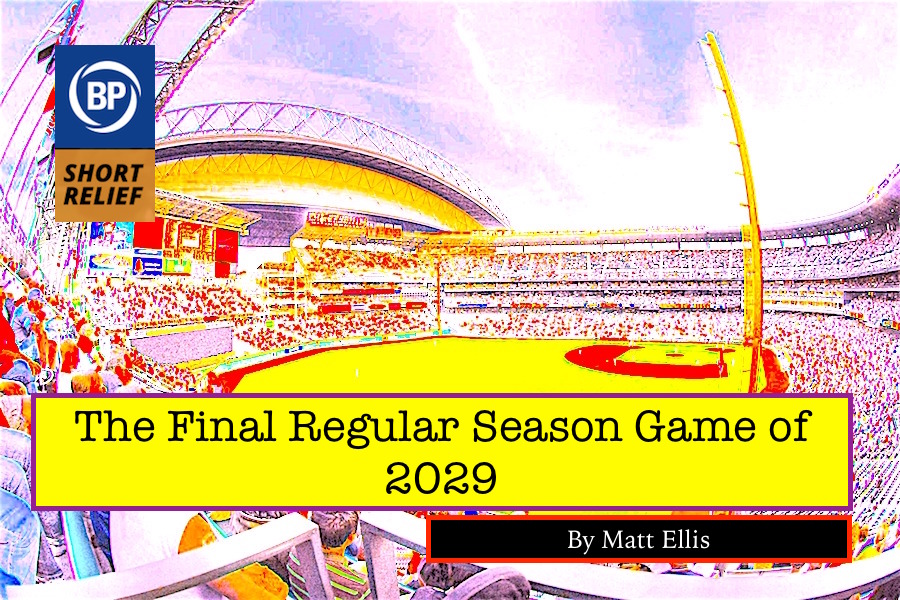
He fouled off the first pitch before stepping out of the box with one foot, undoing the velcro on his batting glove with a zip-zatch-zip-zatch sound. Not for any real reason. It was just a thing he did through habit, like tying his left shoe first or pushing his glasses up his nose with his left index finger. When he settled back in, he dug his left foot down and pointed his bat into the left center gap before resting it just above his shoulder. Then, a curveball.
The wood veneer bat cut through the zone just a few millimeters above where the sweet spot of the ball was. The ball quickly bounced on the artificial grass just before the pitcher’s mound, 62 feet away, but ultimately met the awaiting glove of Portland’s shortstop, who promptly threw it to first base. He hadn’t even let go of the bat. Out 27.
As he walked back to the dugout he shook his head and heard vague, indistinguishable noises from the crowd. None of which he could make out, of course, but the general tone was unmissable. Later that evening he poured himself a merlot and warmed up a packet of green from the fridge and realized that it wouldn’t be so bad: there was no way he would be the only one faulted for the Seattle Mariners missing the playoffs for the twenty-eighth year in a row.
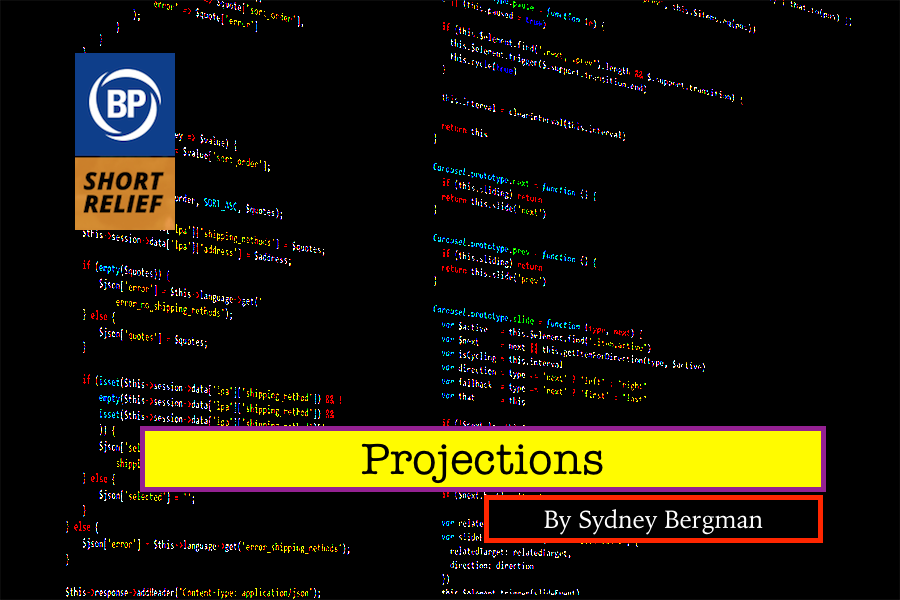
They don’t play the last game of 2029 – there is no game, no baseball, no players to play it. Those who could left on generation ships, out into the black, in search of a better life for their children’s children; those who couldn’t … well, extinction is such a funny word, the way scientists used it. The last breeding pair of pandas at a zoo. The loneliest tortoise, in search of a mate. The sole survivors of a species that gave us Shakespeare and the infield fly rule.
No players appear in the last game of 2029. No umpires, no throng of jubilant or despairing fans, no wide outfield grass to remind us of what was and what could have been.
Only this: A computer, a forgotten tower of a thing, humming in an idle attic, roof not yet given to decay, a set of solar panels powering it. A program, fed conditions for each player, each team, the emergent properties of infield defense and the subtle arcana of a batting order. Something made to forecast the future by a species that saw theirs and chose to ignore it.
Only this: Calculations. Analytics. Possibility and prediction and outcome. A pitcher’s sequence facing left-handed hitters. That batter’s tendency on a two-strike count. The arrangement of the defense, shift or over-shift. The effects of wind, weather, park conditions, the memory of fine clear afternoons. The interplay of skill and shadows and pure, dumb chance.
A fair ball down the baseline past the reach of a simulated player’s outstretched glove. If she makes the grab, it’s an easy jog to meet the runner at first and keep the game tied. If she misses, the ball will shoot into right field, and at least one runner will score. Who’s to say which will happen?
The computer hums to itself, a please little hum, and runs the program again.
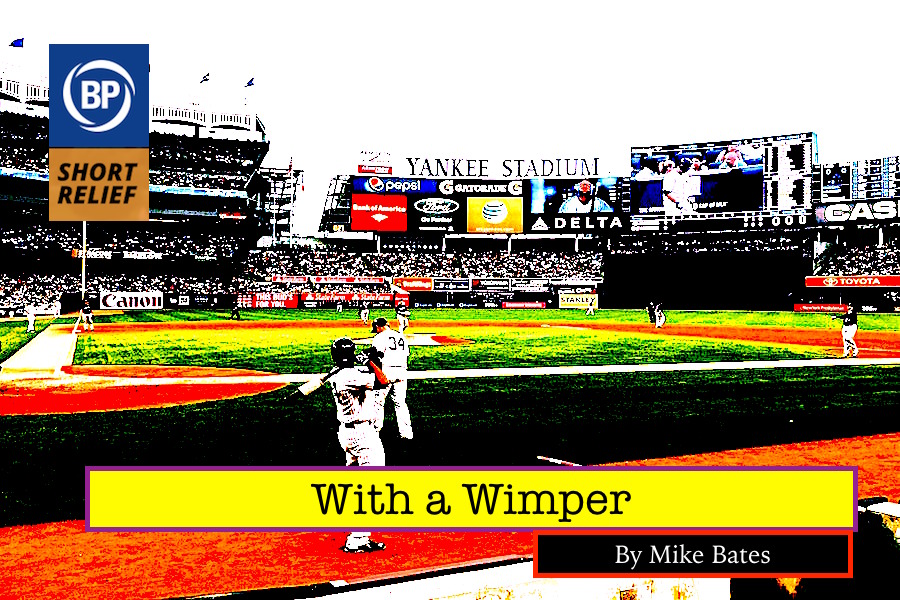
Corey Seager lifts a medium-depth pop fly into right field. Aaron Judge jogs in and stands in under it, allowing it to settle into his glove just like a hundred thousand other pop flies have done over the years. This one, though, is special. It lands softly in the pocket of his glove and he pumps his fist in celebration. He would leap into the air, but the win is bittersweet. So it is too for Gerrit Cole, who has spun the first postseason complete game since Justin Verlander in 2017, giving up a run on five hits to the Dodgers. He basks in his accomplishment, though he feels melancholy seeping through. The fans at Yankee Stadium, who normally would be beside themselves in delirium, cheer cautiously, unsure when they’ll get a chance to watch their champs again.
It is 2021 and, with that last out, the clock has struck the proverbial midnight. The collective bargaining agreement has ended. Hal Steinbrenner is not so crass as to cut short the Yankees’ celebration. He provides the finest in sprayable champagne in the clubhouse for his players. After all, they’ve more than earned it. He will give them until after the parade to clean out their lockers and collect their personal items. He will not have security escort them off the premises. It’s the least he can do.
The players and the owners will resolve their differences in August of 2022. But, by then, it will be too late. The decisions of the previous five years, which saw the minor leagues stripped down to three teams per franchise, eliminated extra innings entirely, and replaced the cork center of baseballs with a superball, have undermined the sport’s popularity to the point that, when the two sides agree to start fresh in 2023, the rest of the world’s collective shrug will convince everyone it’s just not worth it.
There will be no Major League Baseball until nostalgia-craving millennials, fresh off of beating back climate change and discovering a cost-effective solution to our helium shortage, reboot it in 2041. Until then, all we’ll have are our memories. Those will have to be enough.
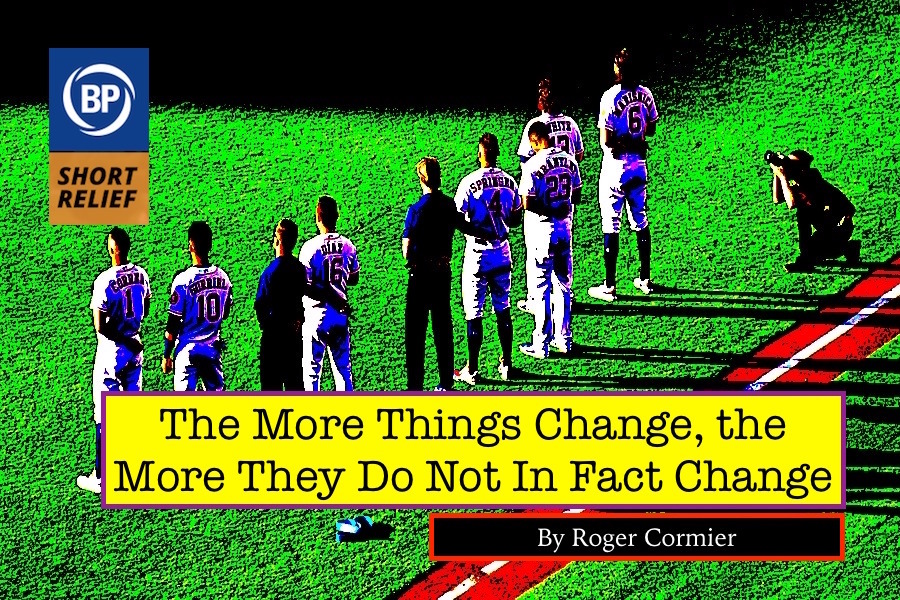
“AND THE ASTROS WIN THE WORLD SERIES!”
Disneyfoxflix viewers were almost able to hear Joe Buck fall out of his chair calling José Altuve’s championship-winning grand slam to give the Houston Astros their first apparent World Series victory since 2017, and officially their first in franchise history. They definitely heard the 30,146 fans inside Juice Concentrate #1 Container cheer as Altuve ran around the bases, throwing his Beats by Dre noise-cancelling headphones towards the heavens as he rounded second base, making those spectators only scream and whistle all the louder.
Some found it rude when Jomman, the third member of the broadcast booth along with Buck and Troy Aikman, asked Altuve afterwards if José was trolling Commissioner Manfred — Manfred after all just hours earlier, at that very spot where Altuve threw the headphones Manfred demanded the team wear while batting during every home game since 2020, unveiled his latest, brightest, most expensive white suit yet to the world, and then, arms extended as long as his listed 7’8″ frame would allow, activated the solar panels powering the NoMuskates strike zone technology.
Troll job or not, starting pitcher Josh James‘ particularly jovial celebration after the game was explained a week later when it was reported James had somehow wagered that the player with the game-winning hit would be listening to the latest Tame Impala single, which, in a strange coincidence, was what Altuve was listening to at the time of his dinger, even though Altuve has said that music usually puts him to sleep, and he has to be in the “right headspace” for it. Despite protestations from James and Luhnow in a joint statement that the allegations were completely untrue and that song totally slaps, most sided with Manfred, whose cartoonishly shrill scream of “ASTROOOOOOOOOSSS!” was such you just knew he was shaking his fist when he said it, was leaked to, sigh, Facebook.
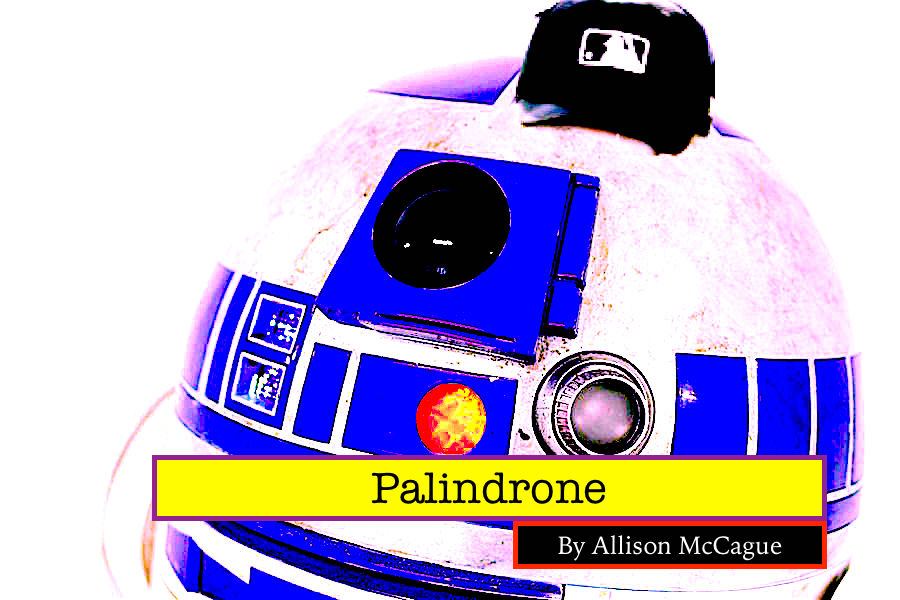
“C’mon Hannah, let’s go to the game. It’s the World Series!”
“I don’t know, Nick…”
“The tickets I got from Sean will go to waste if we don’t use them. Plus, don’t you want to see the first postseason with your little guy in action?”
Hannah bit her lip. She hadn’t gone to an actual game in a long time — not since the restructuring. The protracted work stoppage and the lost 2022 season had dealt the game of baseball a devastating blow. Hannah was a recent grad, having moved to California to chase her dream of being a software developer. She got in on the ground floor of a new startup, developing even better tools for athletes to maximize their potential and glean everything they could from their health data. But they weren’t trusting her with the big stuff yet. In fact, she was utilizing her Ivy League education mostly for data entry.
Nick had recently taken a job in the front office for the Giants and they met at a conference, all of the startups trying to outdo each other showing off their latest tech to executives and trying to get teams to buy in. Despite the year-long hiatus from Major League Baseball, there was a buzz of excitement in the air. Baseball was coming back and it was going to be better than ever. The world was full of possibilities.
But the next seven years didn’t exactly go as planned — for baseball or for Hannah. Major League Baseball was going to hit the ground running, it announced ahead of the 2023 season, with a new CBA finally in place. Not only would baseball return, it would expand. Two new franchises were announced: the Vancouver Orcas and the Las Vegas Jackrabbits. The divisions were realigned.
But Rob Manfred overplayed his hand, desperate to restore his reputation after the strike. The CBA negotiations also left Major League Baseball and Minor League Baseball at an impasse. The two sides walked away from each other. Minor League owners sold their teams and many franchises disappeared. The new skeleton of affiliated ball could not support two more major league franchises. The Orcas and Jackrabbits struggled mightily. Seeing the anticipation among baseball people, Manfred had overestimated the extent to which that excitement trickled down to the fanbase itself, which was weary rather than energized. They had just about had enough. Sure, baseball was back. But they hadn’t been sufficiently convinced that they should care.
The Orcas folded after just two seasons and the Jackrabbits after only three. Somehow, that was the least of Major League Baseball’s problems in the latter half of the 2020s. Extreme weather continued to have increasingly catastrophic impacts across the country. Stadiums up and down the coasts had been damaged by powerful storms and flooding. Rebuilding efforts could not keep up with the harsh timeline of baseball’s long season. Something had to give. At his wit’s end, Rob Manfred resigned. Instead of Manfred being succeeded by someone within the MLB Executive Office, the owners decided that a drastic change was needed. Hannah watched on television in disbelief as the CEO of her company, Elite Sports Technology, was announced as Major League Baseball’s new commissioner. He transferred control of the company to his nephew and right-hand man, but everyone knew that this meant gadgets with the Elite Sports Tech logo would soon be present in every training room in the sport. Hannah suspected sign-stealing technology would appear in dugouts soon too, with the practice simply accepted as fact.
In his first press conference, the new commissioner made an announcement that shocked the owners that installed him and rocked the entire baseball world to its core: Major League Baseball would be consolidating. For the 2028 season, the league would shrink to just twelve teams — six teams in the American League and six teams in the National League — named for regions rather than cities. None of these teams would be located in coastal flood zones. New stadiums would be constructed, with retractable roofs and designs that reflected the latest climate resilience technology.
Hannah watched what she was sure was the final phase of the death of the game she loved, helplessly on the sidelines. With the Giants having ceased to exist, Nick was now jobless. Hannah had been promoted during her six years at Elite Sports Tech, but they still struggled to make the skyrocketing rent in San Francisco on her income alone. Jaded and despondent, Hannah felt she had to channel her displaced passion for baseball and frustration somewhere. Since Elite Sports Tech still wasn’t letting her touch the high-level projects, she took matters into her own hands and transformed their basement into a robotics workshop.
Because the new commissioner had announced another change that was lost among the frenzy of restructuring: the electronic strike zone was coming to the big leagues for the 2028 season. Hannah and Nick had made many “robot umps” jokes over the course of the past six years. Now, sitting in her basement, Hannah thought to herself, “What if I made an actual robot umpire?” She laughed. It was a stupid project. But it was her stupid project and she needed to inject some light-heartedness into her fandom again or it may be crushed for good.
Hannah spent evenings watching this new version of Major League Baseball and working on her robot. By the All-Star Break, he was finished. A dopey little hunk of metal with a cylindrical body on wheels, a head mostly occupied by two giant eyes and not much else, and two skinny arms with four long fingers on each hand. Imagine if R2D2 and Wall-E had a baby; that was this little guy. She decided that something this absurd deserved an absurd name to match. Since the fact that her name was a palindrome is what she always loved most about it, she dubbed her robot umpire creation “Palindrone.”
She tested him in pickup games in the park with her friends, lobbing a pitch right down the middle of the zone and watching with delight as Palindrone raised one finger on his right hand to signal a strike. She programmed some extra perks as well. He could connect to any smart TV via bluetooth, capture the data from the score bug, and display the count with his fingers as the game went on in her living room. He was even prepared with a few generic retorts to any player, manager, or spectator who tried to argue.
“This is the pre-programmed strike zone. It cannot be changed.”
“It is against the rules to argue with the automated strike zone.”
“I’m just calling ‘em as I see ‘em, sir.”
“Please sit down. You are embarrassing yourself.”
Over the course of the 2028 season, something totally unexpected happened: baseball thrived. Sure, there were fewer teams. But fewer teams meant concentrated star power. People flocked from all over the place to see Mike Trout, Jo Addel, Gavin Lux, and MacKenzie Gore face off against Juan Soto, Ronald Acuña Jr., Pete Alonso, and Wander Franco — all on the same field. Major League Baseball sponsored a public bussing system to transport fans scattered across the country to the scant number of stadiums. The regular season was reduced to 154 games to accommodate an earlier postseason, necessitated by blizzards beginning to ravage huge swaths of the country by October. And the World Series was the only postseason to speak of — the top National League team faced off against the top American League team for a seven game series. That was it. But the 2028 World Series sold out every game. And many regular season games sold out as well. Hannah, Nick, and Palindrone took in every second of baseball they could from their couch, amazed that just in its dying breath, baseball seemed to be reborn from the ashes.
Nick was out drinking one night during the 2028-2029 offseason with a few of his former colleagues, some of whom were still in baseball. After a few too many beers, between sputters of laughter, he let slip the existence of Palindrone.
“I think we should use him in games,” said Sean, Nick’s buddy who was now working in the commissioner’s office. “No, seriously!” he responded to the raised eyebrows and raucous laughter. “I think people would get a kick out of it. Plus we can push merchandise, have Palindrone races, the whole nine yards.”
“Nick you DIDN’T!” exclaimed Hannah after he stumbled in the door and recounted the story.
“I’m sorry.”
“That thing is not supposed to see the light of day! It’s just a silly thing I made for myself because I was angry and bored.”
“Sean thinks it could actually work.”
The next day, Hannah’s phone rang, Sean’s name on the display. She answered, prepared to hang up on him quickly. But a long back-and-forth ensued. Hannah knew she and Nick needed the money. So she reluctantly agreed to let Major League Baseball use her robot ump.
Hannah looked up at Nick, two tickets to Game 7 of the 2029 World Series in his outstretched hand. Palindrone merchandise had sold better than any player jersey during the 2029 season — t-shirts with his goofy, wide-eyed face on the front, the words “This is the pre-programmed strike zone. It cannot be changed.” screen printed underneath. There were hats. There were (talking) figurines. There were memes. Oh, there were memes — some with Sarah Palin’s face photoshopped on them (“I can see the strike zone from my house!”) and some Star Wars jokes (“These are not the Palindrones you’re looking for.”), among others. She had earned enough money from the enterprise to pay off her student loans and live comfortably. But she still couldn’t bring herself to watch the robot in action. It felt exposing, this deeply personal thing she had made to keep her company in the living room during baseball games at a low point in her life being the face of the new Major League Baseball.
But in a world that had recently felt so joyless, so hopeless, Palindrone was bringing people joy somehow. She took the tickets from Nick’s hand. “Let’s go,” she said.
Thank you for reading
This is a free article. If you enjoyed it, consider subscribing to Baseball Prospectus. Subscriptions support ongoing public baseball research and analysis in an increasingly proprietary environment.
Subscribe now